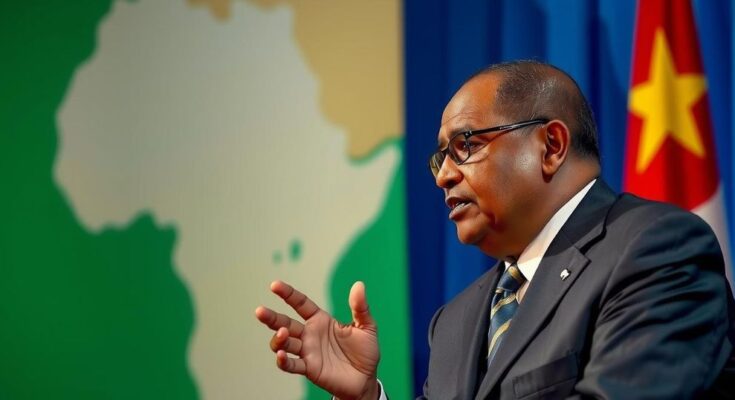Somalia President Hassan Sheikh Mohamud has criticized Ethiopia’s attempts to annex Somali territory, emphasizing its historical claims dating back to colonial times. He discussed recent defense pacts with Egypt and Turkey aimed at countering Ethiopian ambitions, asserting that Ethiopia’s access to the Red Sea should come through peaceful negotiation rather than territorial claims. Meanwhile, Ethiopian Prime Minister Abiy Ahmed maintains that access will be sought through peaceful means and emphasizes the legitimacy of Ethiopia’s requests.
In a recent address to the Somali parliament, President Hassan Sheikh Mohamud condemned Ethiopia’s sustained pursuit of territorial annexation from Somalia, asserting that the Addis Ababa administration is intent on expanding its claims to Somali land. Focusing on Ethiopia’s historical occupation since colonial times, President Mohamud criticized the Ethiopian government’s ambitions, which he argues violate international law. He referenced Ethiopia’s prior annexations of Somali territory and indicated that the ongoing efforts represented a direct challenge not only to Somalia but also to the principles of the African Union, which Ethiopia is expected to uphold as its headquarters. The President specifically criticized an agreement reached between Ethiopia and Somaliland that purportedly facilitates Ethiopian access to the Red Sea in exchange for recognizing Somaliland’s sovereignty. In defending Somalia’s sovereignty, President Mohamud announced recent defense pacts with Egypt and Turkey, asserting that these agreements would curb Ethiopian ambitions rather than destabilize the Horn of Africa. He dismissed intimations that the absence of Ethiopian troops would precipitate the resurgence of Al-Shabaab, contending that Somalia had already liberated significant territory from the militant group without relying on Ethiopian military assistance. Prime Minister Abiy Ahmed of Ethiopia recently reiterated his nation’s quest for access to the Red Sea, emphasizing that this pursuit would be undertaken by peaceful means rather than military force. His remarks came in the wake of criticism concerning the agreement with Somaliland, which some perceive as an encroachment on Somali territory. In what appears to be a mounting diplomatic tension, both leaders are navigating a complex landscape of historical grievances, territorial integrity, and regional security matters that may shape the future stability of the Horn of Africa.
The Horn of Africa remains a volatile region characterized by socio-political complexity and historical territorial disputes. Ethiopia and Somalia have a long history of conflict and territorial claims that trace back to colonial times. The recent developments involve strategic defense alliances that Somalia has formed with other nations to strengthen its position against Ethiopia’s territorial ambitions. Moreover, the historical context of the Eritrean-Ethiopian conflicts and the rise of extremist groups further complicate the dynamics of security and sovereignty in both nations. The newly reported agreements and Ethiopia’s quest for access to the Red Sea introduce additional layers of diplomatic negotiations in an already fragile geopolitical landscape.
In summary, President Hassan Sheikh Mohamud’s remarks highlight a significant ongoing dispute regarding Ethiopia’s aspirations to annex Somali territory, framing it as a violation of international law and territorial integrity. The contrast between the positions of the Somali and Ethiopian leadership underscores the fraught relations in the region, where historical grievances intersect with contemporary security challenges. Moreover, the responses from both leaders indicate an urgent need for clear dialogue and diplomatic engagement to mitigate potential tensions and foster regional stability.
Original Source: www.garoweonline.com




